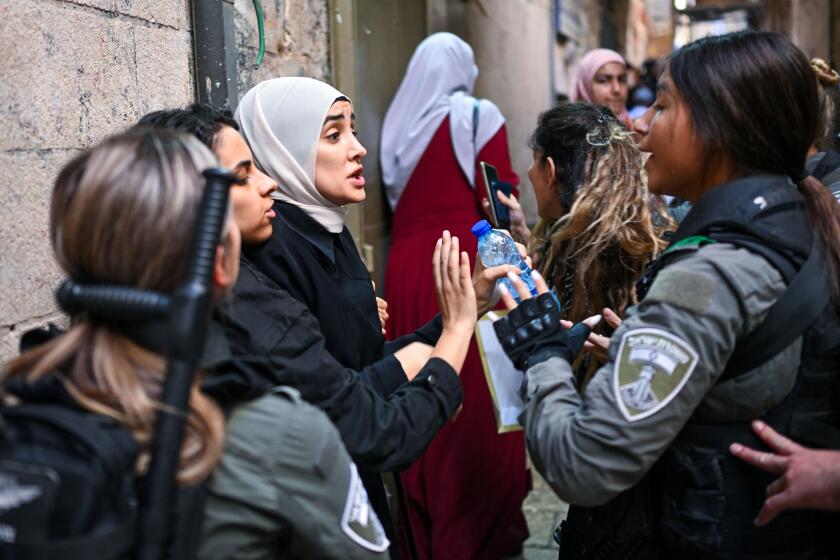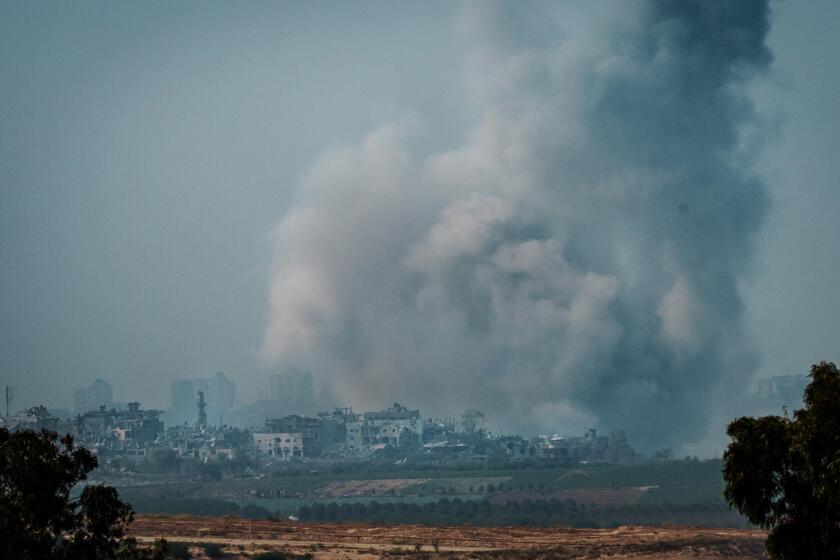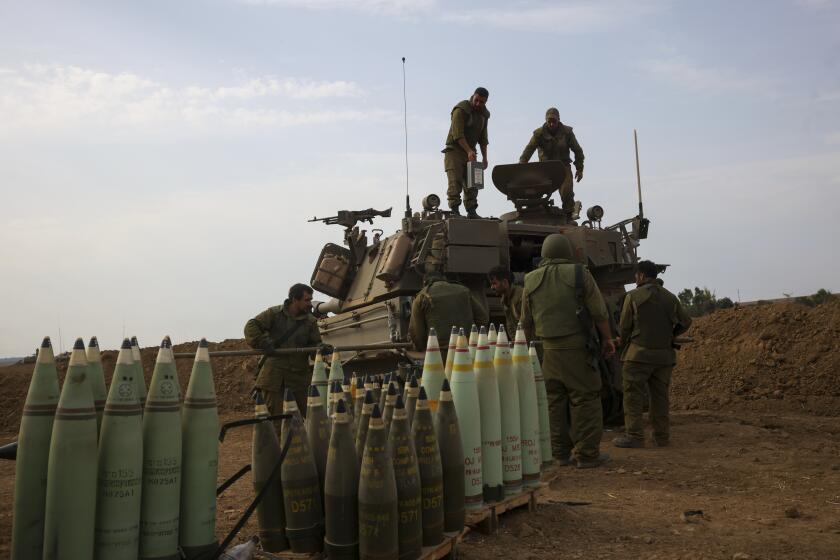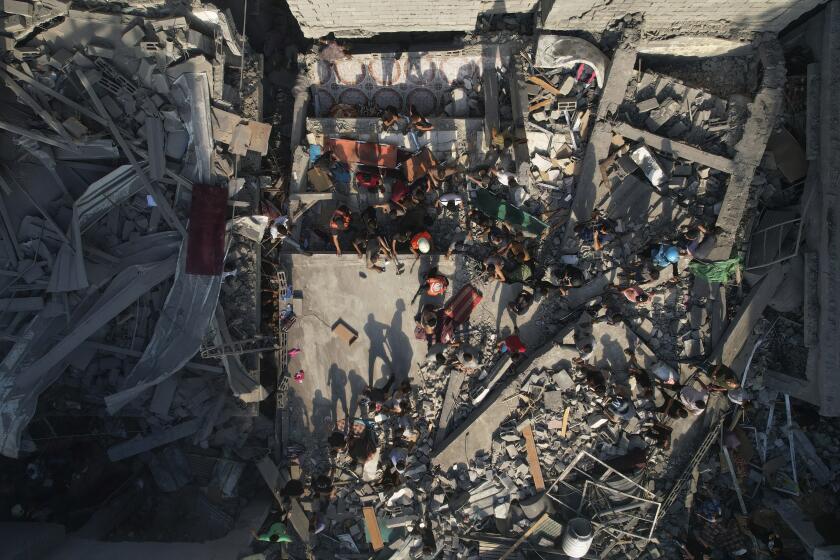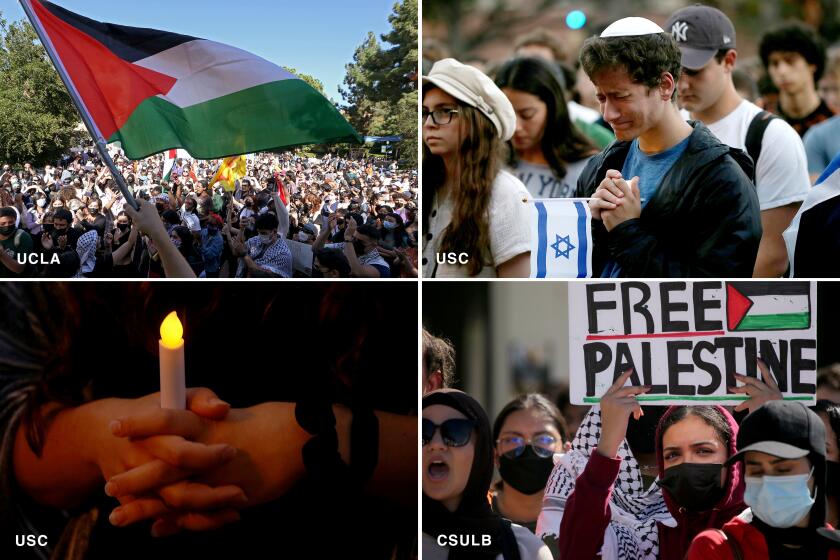Palestinian Americans stuck in Gaza as all-out Israeli invasion looms
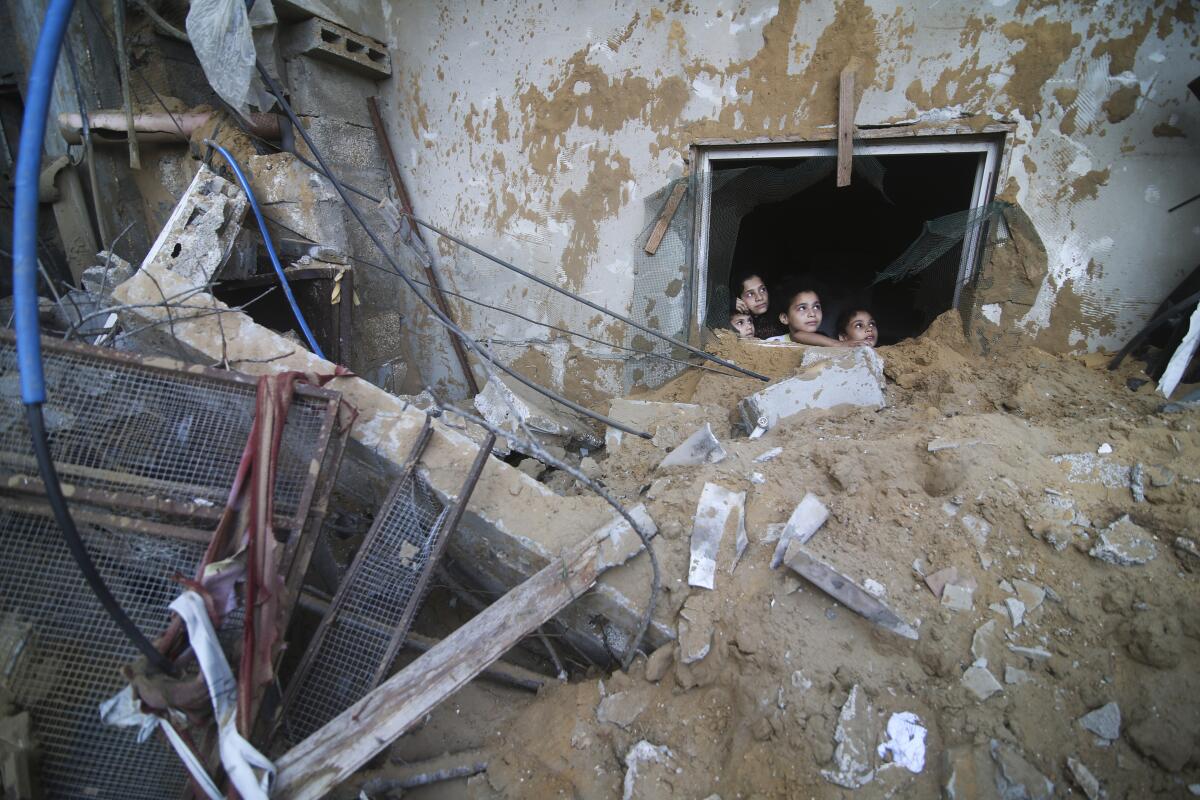
- Share via
JERUSALEM — It was Tuesday, three days after Hamas militants launched the deadliest attack on Israel in over 50 years, slaughtering hundreds of civilians and sparking a ferocious Israeli response, that Nabil Al Shurafa realized that helping his mother leave Gaza was going to be a difficult task.
Until that morning, the American-born Al Shurafa, a 39-year-old medical researcher in Chicago, thought his 66-year-old mother, Naela, naturalized in the late 1990s and a 20-year resident of Camarillo, would be able to leave the enclave, despite the relentless Israeli bombing campaign.
“She’s a U.S. citizen,” he said. “Everyone was saying, ‘No way would they keep U.S. citizens here.’”
Hours earlier, his mother, who had been visiting Al Shurafa’s sick grandmother in Gaza since the beginning of the month, had made her way to the Rafah border crossing with Egypt. There, she and dozens of other dual passport holders hoped to escape before Israel’s anticipated ground incursion.
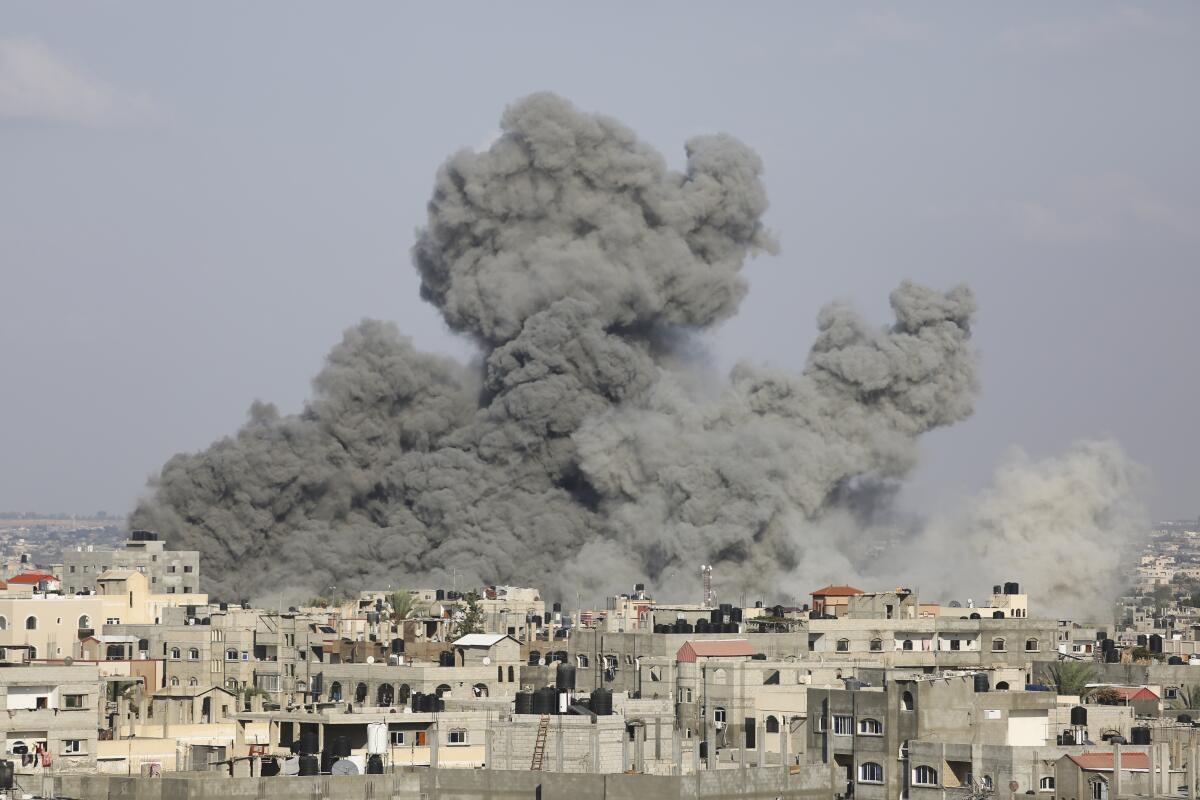
She received an exit stamp on the Palestinian side and was about to depart when four missiles landed in the no-man’s land between Gaza and Egypt, severing the last feasible escape route from the 25-mile-long strip which has long been under a strict blockade by both Egypt and Israel.
“She needed 10 minutes, that’s all, and she would have been out,” Al Shurafa said. For an agonizing hour, he thought his mother was dead. But then she was able to call family members and she told them she was returning to her family’s house in Gaza.
“She kept telling me, ‘Nabil, call your representatives, call everyone. I have to get out,’” he said. “I knew then my work was cut out for me.”
As the Jewish Sabbath fell and Muslims marked their principal prayer day, Israelis and Palestinians struggled with the terrifying new reality after the militant group Hamas’ deadly attack on Israel.
Al Shurafa’s mother is one of reportedly hundreds of Palestinian Americans stranded in Gaza, frantically seeking ways to leave amid an Israeli counteroffensive and siege that has left Gazans with no fuel or electricity and little water. Meanwhile, the death toll from Israel’s air attacks increases. On Sunday, the Palestinian Ministry of Health in Gaza reported 2,670 dead and 9,600 wounded.
For Al Shurafa, it’s been a series of days and nights with little sleep, dialing embassies and consulates in the Middle East during his nighttime hours, and a frenetic series of daytime calls to the offices of senators, congressmen and anyone else who might be able to help.
“It’s getting to the point where I have to ask her if she has enough food,” Al Shurafa said.
The Israeli military said in a statement on Saturday night that it was preparing a coordinated offensive in Gaza using air, ground and naval forces.
Israeli Americans too have found themselves stranded in Israel because of canceled flights and disruptions to travel from the ongoing conflict. But while the U.S. Embassy in Jerusalem has facilitated charter flights to European destinations and a ship transfer from the Israeli port of Haifa to Cyprus, Palestinian Americans say they have received little guidance, even as the threat of an all-out invasion in Gaza appears imminent.
“My brother, he’s now in Gaza, and he’s called the U.S. Embassy in Tel Aviv, in Cairo, everywhere,” said Mohammad Yaghi, a 60-year-old IT engineer and business owner in North Carolina. “They barely answer, and if they do they tell him no one knows anything, or to wait, or they just hang up.”
Yaghi once had a similar experience himself. In 2006, when Israel launched its offensive to retrieve Gilad Shalit, an Israeli soldier kidnapped by Hamas, it took 11 days to be evacuated from Gaza, he said.
Israel battled Hamas infiltrators for a third day and massed tens of thousands of troops near the Gaza Strip after the biggest attack in decades on Israeli soil.
“We suffered back then with the embassy,” he said. “In general, they always handle Palestinian Americans like we’re third-class citizens; not even second class.”
When Hamas militants on Oct. 7 crossed the border into Israel and massacred civilians or abducted them in kibbutzes, towns and at an outdoor music festival, the casualty and kidnapping list included U.S. citizens. With Israel seeking to retaliate and the U.S. calling for the return of American citizens held captive, officials have now also begun stepping up their public mention of the dangers facing Palestinian Americans.
In remarks to the press after meeting with Egyptian President Abdel Fattah Sissi on Sunday, U.S. Secretary of State Antony J. Blinken reiterated what he called Israel’s right to defend itself, but also said, “The way that Israel does this matters.”
“It needs to do it in a way that affirms the shared values that we have for human life and human dignity,” he said, “taking every possible precaution to avoid harming civilians.”
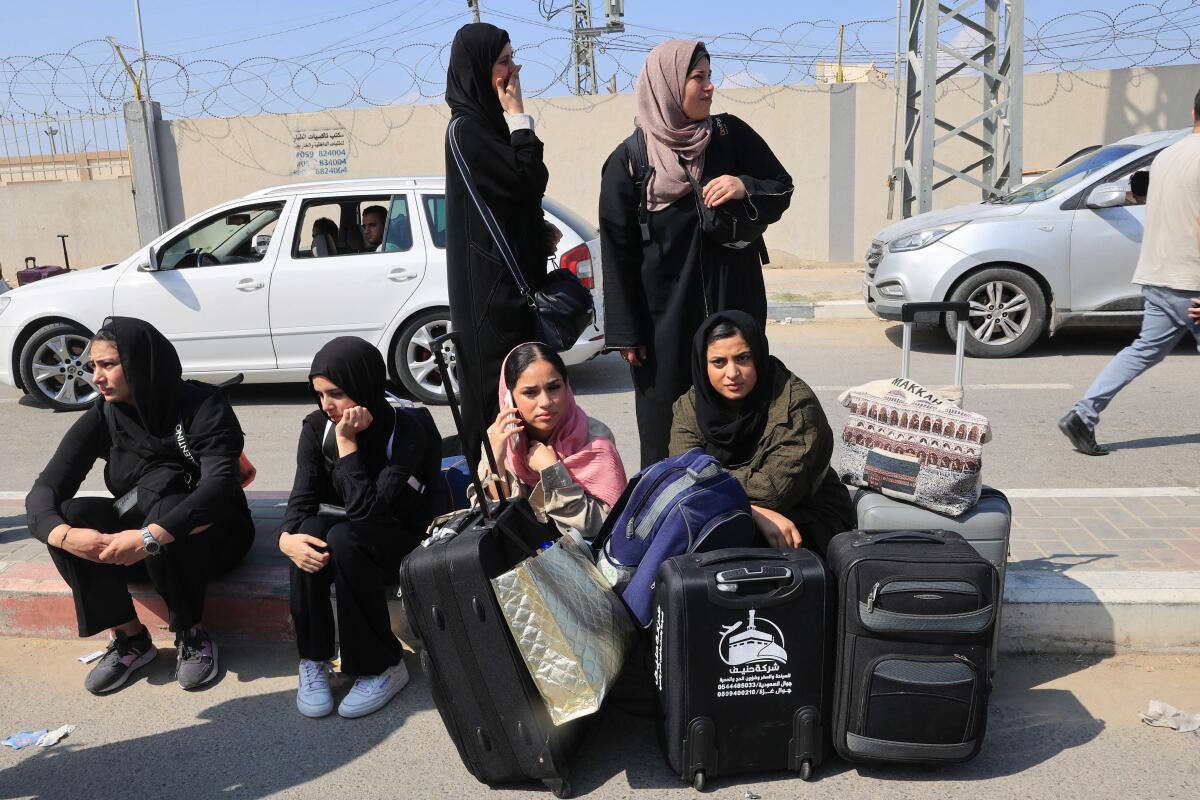
Egypt was the sixth country Blinken has traveled to in the last three days as he has urgently sought to enlist Arab support to contain the war and secure the freedom of hostages. He has also added the escalating humanitarian crisis in Gaza to the agenda.
Reaching Palestinian Americans in the besieged Gaza Strip, though, is far more complicated than helping out Americans and Israeli Americans seeking to leave Israel.
In his talks, Blinken has urged the opening of humanitarian corridors to help Palestinians who have been ordered by Israel to flee the northern half of the Gaza Strip. Because of the Israeli siege, the only available route out of Gaza is through Rafah in the south. The corridors could also be used to funnel humanitarian aid into Gaza after Israel cut off supplies from the region of 2.3 million Palestinians. Those safe passages, however, have yet to materialize.
Palestinian Americans with Gaza connections struggle with feelings of helplessness over violence after Hamas’ attack and Israel’s retaliation.
U.S. officials have told Palestinian Americans in Gaza to attempt to reach the Rafah border crossing. But that crossing so far has not been opened. Egypt, which usually keeps it sealed, claimed it did open it from its side but that the other side was being blocked by Hamas and as the result of Israel’s air campaign.
Egypt is generally reluctant to permit the entry of Palestinians because it fears a refugee crisis and also doesn’t want to be seen as an accomplice to Israel’s forced displacement. But Sissi is under U.S. pressure to allow Palestinian Americans and other foreign nationals through.
U.S. officials have repeatedly insisted American citizens, many stranded when U.S. air carriers canceled flights, should sign up through a State Department internet portal to indicate their desire to leave the region. U.S. citizens are also routinely encouraged to sign up with a government website ahead of travel so that they can be contacted in case of emergency.
But it was only a few days ago that the option to register as a citizen in Gaza on crisis intake forms was even offered, Al Shurafa said.
“You’re the U.S. government. We’re supposed to be allies with Israel. You can’t tell them to just stop bombing for few hours and get our citizens out?” Al Shurafa said. “Our own people are running from our allies.”
College campuses are supposed to be bastions of intellectual discourse and debate, but the war in Gaza underscores tense narratives and little if any interchange between students.
Such feelings of neglect have fed into a complicated attitude many Palestinian Americans have toward their adopted home and its Middle East policy. Many feel shunned because of the U.S. government’s ongoing support for Israel, including some who immigrated to America before Israel was founded in 1948.
For the record:
8:23 a.m. Oct. 16, 2023An earlier version of this story said Jenan Kawash has a cousin who is a U.S. green card holder. Her cousin is a permanent resident of Jerusalem. Two other relatives are U.S. citizens.
That feeling has only increased in the last eight days, said Jenan Kawash, a 32-year-old event producer and public relations specialist in New York City who has three relatives, two of them U.S. citizens, trapped in Gaza on a visit..
“There will never be a collective American effort to help Americans with hyphenated Arab identity, specifically a hyphenated Palestinian identity. That’s pretty clear,” she said. She and other Palestinian Americans have taken to social media, she added, to raise awareness of what is happening in Gaza.
Though she appreciated the freedoms afforded to her by being in the U.S., she nevertheless said that it could never feel like home.
“I know that I have the ability to say these things, that my parents stayed quiet so as to assimilate,” she said. “But now we realize that the sense of safety is an illusion, so we have the willpower to be vocal about it. “
Bulos reported from Jerusalem and Wilkinson from Washington.
More to Read
Sign up for Essential California
The most important California stories and recommendations in your inbox every morning.
You may occasionally receive promotional content from the Los Angeles Times.
